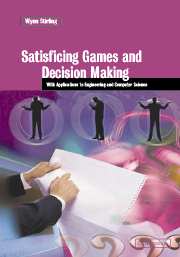Book contents
- Frontmatter
- Contents
- List of figures
- List of tables
- Dedication
- Preface
- 1 Rationality
- 2 Locality
- 3 Praxeology
- 4 Equanimity
- 5 Uncertainty
- 6 Community
- 7 Congruency
- 8 Complexity
- 9 Meliority
- Appendices
- Appendix A Bounded Rationality
- Appendix B Game Theory Basics
- Appendix C Probability Theory Basics
- Appendix D A Logical Basis for Praxeic Reasoning
- Bibliography
- Name index
- Subject index
Appendix B - Game Theory Basics
Published online by Cambridge University Press: 12 October 2009
- Frontmatter
- Contents
- List of figures
- List of tables
- Dedication
- Preface
- 1 Rationality
- 2 Locality
- 3 Praxeology
- 4 Equanimity
- 5 Uncertainty
- 6 Community
- 7 Congruency
- 8 Complexity
- 9 Meliority
- Appendices
- Appendix A Bounded Rationality
- Appendix B Game Theory Basics
- Appendix C Probability Theory Basics
- Appendix D A Logical Basis for Praxeic Reasoning
- Bibliography
- Name index
- Subject index
Summary
In this appendix we summarize the basic concepts of von Neumann–Morgenstern game theory that are relevant to our treatment of that topic in this book.
Definition B.1
An agent, or player, X, is a decision maker; that is, an entity that is capable of autonomously choosing from among a set of options.
Definition B.2
A decision problem for X is a triple, (U, π, C), consisting of an option space, U (also called the action space), to be applied by the players, a set of outcomes or consequences, C, to be realized by the players, and a mediation mechanism, or mapping function, π: U → C, that relates choices and outcomes.
Definition B.3
A joint decision problem, or game for a family of agents, {X1, …, XN}, where N ≥ 2, is a triple (U, π, C) where U = U1 × … × UN is the joint action space with Ui being Xi's individual action space, C = C1 × … × CN with Ci being Xi's individual consequence space, and π = (π1, …, πN) where πi: U → Ci is a vector of mapping functions, one for each player.
An option vector is an ordered set of options, u = {u1, …, uN}, one for each player, where ui ∈ Ui.
- Type
- Chapter
- Information
- Satisficing Games and Decision MakingWith Applications to Engineering and Computer Science, pp. 219 - 222Publisher: Cambridge University PressPrint publication year: 2003
- 1
- Cited by



